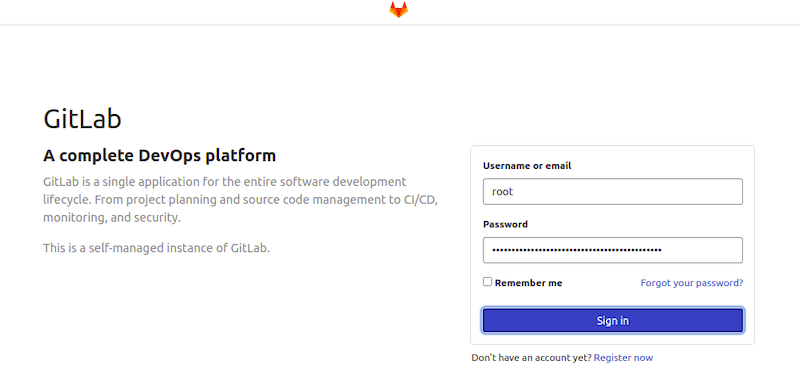How To Install GitLab on Linux Mint 22

In this tutorial, we will show you how to install GitLab on Linux Mint 22. GitLab is a powerful web-based DevOps platform that has revolutionized the way teams collaborate and manage projects. It provides a comprehensive set of tools for version control, continuous integration, deployment, and project management, making it an essential tool for developers and IT professionals alike.
This article assumes you have at least basic knowledge of Linux, know how to use the shell, and most importantly, you host your site on your own VPS. The installation is quite simple and assumes you are running in the root account, if not you may need to add ‘sudo‘ to the commands to get root privileges. I will show you the step-by-step installation of GitLab on Linux Mint 22.
Prerequisites
- A server running one of the following operating systems: Linux Mint 22.
- It’s recommended that you use a fresh OS install to prevent any potential issues.
- While we’ll guide you through the process, a basic understanding of the command line will be beneficial. If you’re new to the CLI, you might want to acquaint yourself with some fundamental commands.
- An active internet connection.
- 4GB of RAM (8GB recommended for improved performance).
- 2 CPU cores (4 cores recommended for better performance).
- At least 2.5GB of free disk space (10GB recommended for ample storage).
- Administrative privileges are essential for installing and configuring software on your system. Ensure that you have superuser or sudo access.
Install GitLab on Linux Mint 22
Step 1. Update Your Linux Mint System.
Before installing any packages, it’s a good practice to update the package repository to ensure you have access to the latest versions. Run the following command:
sudo apt update sudo apt upgrade
Now, let’s install the essential packages that GitLab needs. Execute the following commands:
sudo apt-get install curl openssh-server ca-certificates tzdata perl
Next, we need to install Postfix, which is required for sending email notifications from GitLab. Run the following command:
sudo apt-get install postfix
During the Postfix installation, you will be prompted to select a mail server configuration. Choose the option “Internet Site” and provide your domain name or the hostname of your GitLab instance.
Step 2. Installing GitLab.
With the dependencies in place, we can now add the GitLab package repository and install GitLab itself. To add the GitLab package repository, execute the following command:
curl https://packages.gitlab.com/install/repositories/gitlab/gitlab-ee/script.deb.sh | sudo bash
This command downloads and runs a script that sets up the repository for GitLab Enterprise Edition (EE) on your Linux Mint system.
Now, we can proceed with installing the GitLab package. Run the following command, replacing https://gitlab.example.com with the desired URL for accessing your GitLab instance:
sudo EXTERNAL_URL="https://gitlab.example.com" apt-get install gitlab-ee
If you have a domain name set up for your GitLab instance, make sure to update the DNS records to point to your server’s IP address. Additionally, if you want to enable HTTPS, you can use Let’s Encrypt to obtain a free SSL certificate. GitLab provides built-in support for Let’s Encrypt integration.
Step 3. Initial Configuration and Login.
Once the installation is finished, you can access your GitLab instance through a web browser and perform the initial configuration.
Open your preferred web browser and navigate to the URL you specified during the installation (e.g., https://gitlab.example.com). You should see the GitLab login page.

To log in for the first time, you need to use the initial admin account. The default username is root, and the password is stored in a file on your server. To retrieve the password, run the following command in the terminal:
sudo cat /etc/gitlab/initial_root_password
After a successful login, you will be prompted to change the default password. Choose a strong and secure password to protect your GitLab instance.
Step 4. Configure GitLab Settings.
GitLab provides a wide range of configuration options that you can modify by editing the /etc/gitlab/gitlab.rb file. This file contains various settings related to network, authentication, email, and more. To edit the configuration file, run the following command:
sudo nano /etc/gitlab/gitlab.rb
Make the desired changes and save the file. After modifying the configuration, you need to apply the changes by running the following command:
sudo gitlab-ctl reconfigure
Step 5. Set Up Email Notifications.
GitLab uses email notifications to keep users informed about various events, such as issue updates, merge request approvals and pipeline statuses. To enable email notifications, you need to configure the email settings in the /etc/gitlab/gitlab.rb file.
Uncomment and modify the following lines according to your email provider’s settings:
gitlab_rails['smtp_enable'] = true gitlab_rails['smtp_address'] = 'smtp.example.com' gitlab_rails['smtp_port'] = 587 gitlab_rails['smtp_user_name'] = 'your_email@example.com' gitlab_rails['smtp_password'] = 'your_email_password' gitlab_rails['smtp_domain'] = 'example.com' gitlab_rails['smtp_authentication'] = 'login' gitlab_rails['smtp_enable_starttls_auto'] = true gitlab_rails['smtp_tls'] = false
Replace smtp.example.com, your_email@example.com, your_email_password, and example.com with your actual email provider’s details. After making the changes, save the file and run sudo gitlab-ctl reconfigure to apply the new email settings.
Congratulations! You have successfully installed GitLab. Thanks for using this tutorial to install the latest version of GitLab on the Linux Mint system. For additional help or useful information, we recommend you check the official GitLab website.